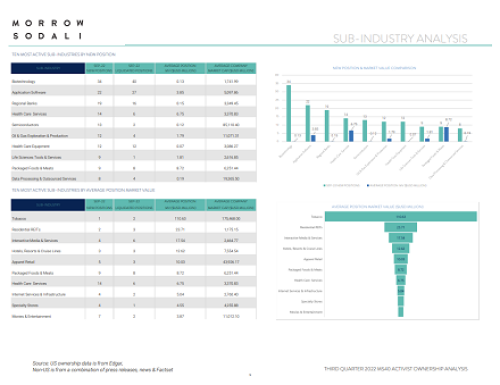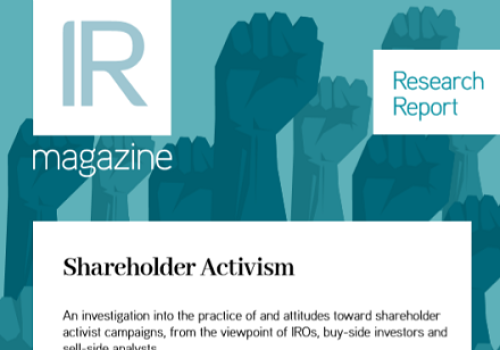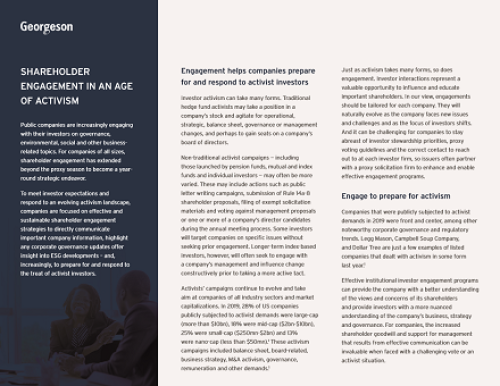– The Guardian reported that GSK chief executive Emma Walmsley has come under pressure from a second activist hedge fund firm, Bluebell Capital Partners, which is pushing for change at the company. Bluebell Capital Partners has joined Elliott Management on the pharmaceutical company’s shareholder roster. In a letter to GSK chair Sir Jonathan Symonds, Bluebell called on the company to appoint more directors with scientific experience to its board, and to run a ‘thorough and robust process’ to find a leader for the drugs and vaccines business following the planned spin-off of the consumer health division next summer. GSK put out a firm rebuttal, saying that Walmsley would lead the pharmaceuticals and vaccines company after the split. Marco Taricco and Giuseppe Bivona, the chief investment officers at Bluebell, said GSK’s financial performance had been disappointing during the last few years, and argued that Walmsley had less industry experience than other pharma bosses.
– The Wall Street Journal (paywall) reported that Twitter said it agreed to pay more than $800 mn to settle a consolidated class action securities lawsuit alleging the company deliberately misled investors about user engagement in 2015. Twitter said the proposed settlement would resolve all claims against it and the other named defendants without any admission, concession or finding of any fault, liability or wrongdoing. The shareholder action claimed Twitter misled investors about two closely tracked metrics: monthly active users – a measure of the total number of users on its platform – and timeline views, a measure of how frequently users interacted with the platform. Twitter said it would pay $809.5 mn under the binding agreement to settle claims alleging securities law violations, adding that it continues to deny any wrongdoing or improper actions.
– The Financial Times (paywall) reported on China’s ongoing cryptocurrency crackdown. The country’s central bank declared that all activities related to digital coins are ‘illegal’ in what the paper described as a bid to stop residents trading on overseas exchanges. The move was an apparent bid to close a loophole that remained after the People’s Bank of China in May banned domestic financial institutions from providing cryptocurrency transaction services. In the months since, Chinese traders have continued to invest in cryptocurrency using foreign platforms.
– In other crypto news, CNBC reported that Coinbase has halted plans to launch an interest-earning product two weeks after CEO Brian Armstrong criticized the SEC in a tweet for what he said was its lack of guidance on the matter. ‘We had hundreds of thousands of customers from across the country sign up and we want to thank you all for your interest,’ the post said. ‘We will not stop looking for ways to bring innovative, trusted programs and products to our customers.’ A Coinbase spokesperson declined to comment beyond the content of the blog post. The SEC did not immediately respond to a request for comment. SEC chair Gary Gensler testified recently that the agency is looking at crypto-related assets to determine whether they fall under securities laws and he has shown interest in increasing regulation of the space.
– ‘It was a week in which Bitcoin and other cryptocurrencies once again appeared to be trapped in lockstep with the traditional markets, vulnerable to the same supply chain shocks and economic mismanagement as the S&P and other indices,’ said CityAM. But in what it described as a ‘timely reminder to zoom out and look at the big picture’, the paper reported that Twitter had revealed plans to allow tipping via Bitcoin. Users around the world will also be able to post their Bitcoin wallet directly into their Twitter profile.
– According to Reuters, as many as 2,000 companies could disappear from the off-exchange ‘pink sheets’, long a favorite of retail investors, when a new rule aimed at stamping out fraud in this notoriously risky segment of US equities markets comes into effect next week. The SEC rule increases investor disclosures by requiring off-exchange issuers, frequently penny-stock companies that do not meet the main exchanges’ listing standards, to make accurate, up-to-date financial information publicly available. Due to a loophole in the existing rules, around 2,000 of the roughly 11,000 companies quoted on the Pink Market operated by OTC Markets Group do not publicly provide such information. OTC Markets has been trying to spread the word and encourage companies to get their paperwork in order, but it was unclear how many would do so in time for the September 28 deadline, if at all, said Daniel Zinn, OTC Markets’ general counsel. The SEC did not respond to a request for comment.
– CityAM reported that UK equities are still undervalued. Nearly nine in 10 professional investors from the UK, the US and Germany believe UK equities are undervalued, according to new research shared exclusively with the paper. The investors, who collectively manage more than $300 bn, said in an MBH survey that one of the key reasons for optimism around UK equities is that the country has one of the best Covid-19 vaccination programs in the world, and this is contributing to a faster recovery and greater economic growth than that seen in many other developed countries. Over the next 12 months, 47 percent of the professional investors interviewed said they will increase their allocation to UK equities, compared with just 5 percent who expect to reduce it.
– US companies’ optimism about business conditions in China has recovered to hit three-year highs, an annual survey showed this week. Reuters reported that more than 75 percent of respondents to the 2021 survey conducted by the American Chamber of Commerce in Shanghai and PwC China described themselves as ‘optimistic or slightly optimistic’ about their five-year business outlook. Reuters said the American Chamber of Commerce in Shanghai attributed the positive outlook to increased revenues and decreased Covid-19 infections in China with its strict pandemic policies, even though the survey’s results also acknowledged some reservations about Beijing’s Covid-19 policies.
– The WSJ reported that the International Organization for Standardization (ISO) has thrown its weight behind a push for companies to go beyond traditional ideas of good governance to include more environmentally and socially conscious models. The Geneva-based ISO’s first framework for good governance is unique because it represents the outcome of a consensus-driven process involving more than 70 countries, according to experts involved in creating the standard. The framework released by the ISO defines governance as a system by which an organization is held accountable for achieving a defined purpose in an ethical and responsible manner. The standard also spells out guidelines for internal controls, which include a company’s risk-management system, compliance program and financial controls. One of the goals of the standard is to push companies to move beyond the concept of governance that is set up merely to optimize financial results, said Victoria Hurth, a fellow at the University of Cambridge’s Institute for Sustainability Leadership and co-chair of the group of experts who developed the ISO standard.










